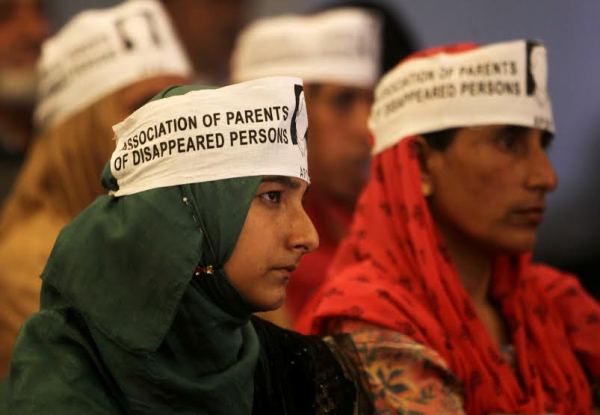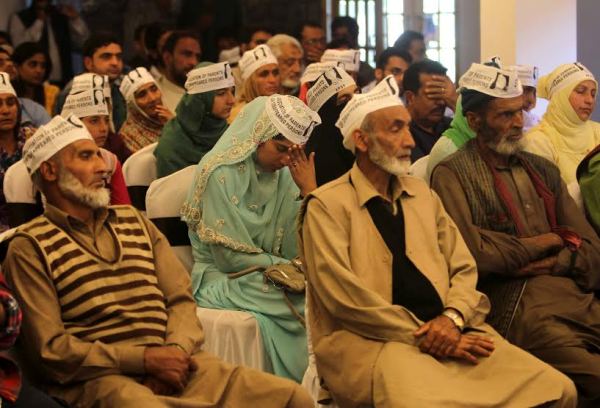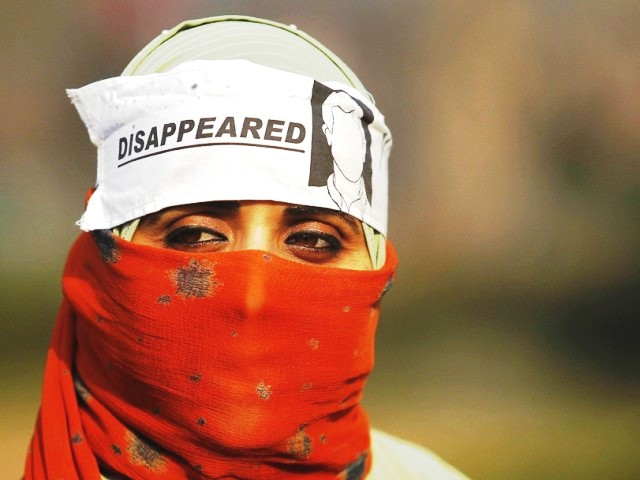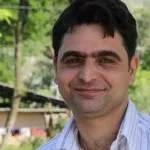Among many other serious crimes committed against humanity in disputed Jammu and Kashmir, the Indian government forces are also accused of subjecting between 8,000 to 10,000 Kashmiris to enforced custodial disappearance since the eruption of popular armed uprising against Indian rule in restive Himalayan region in 1989.
During a press conference in 2008, the state government led by Chief Minister Omar Abdullah admitted the number of those people who have disappeared in Jammu and Kashmir was 4,000. But the government also claims that many of those listed as disappeared may have crossed over to the other side of the Line of Control (LOC) – the de facto border dividing two parts of Kashmir – to receive ‘arms training’ in Muzaffarabad to fight India.
India and Pakistan have fought two full-fledged wars over disputed Kashmir in 1947-48, 1965 and a mini-war in 1998, which is also remembered as the Kargil War. Both nuclear countries claim the disputed Himalayan region of Kashmir in full but have administered it in parts since 1947.
Pakistan celebrates September 6 as Defence Day (Youm-e-Difa) to commemorate sacrifices of her soldiers who lost their lives defending Lahore and Sialkot in the Indo-Pak war of 1965, also known as the Second Kashmir War.
There was a time in Kashmir when elderly people would make wills on their death beds and advise their progeny to hoist Pakistani flags on their tombstones and graves once Kashmir merged with Pakistan. The percentage of such pro-Pakistani people in disputed Kashmir has dwindled since, as more voices are raised in favour of the region’s complete independence after the anti-India uprising erupted in 1989.
International Day of the Disappeared
The Jammu and Kashmir Coalition of Civil Society (JKCSS) and Association of Parents of Disappeared Persons (APDP) commemorated International Day of the Disappeared in Srinagar, the capital of Indian-administered Jammu and Kashmir separately. The APDP organised a sit-in protest against hundreds of enforced disappeared persons while the JKCCS organisers staged a play on the same theme and young Kashmiris recited poems to draw attention to a burning issue in the Kashmir valley.
 Families and relatives of those Kashmiris subjected to custodial disappearances since 1989-90. Photo: Javed Dar
Families and relatives of those Kashmiris subjected to custodial disappearances since 1989-90. Photo: Javed DarAugust 30 is observed as International Day of the Disappeared worldwide.
“In this struggle for justice we are not alone. Several movements across the globe have been raising their voice for the victims of enforced disappearances. Like us, many families have organised themselves in Philippines, Indonesia and Thailand,” the APDP chairperson Parveena Ahangar said in Srinagar.
Ms Ahangar’s group also exhibited various paintings to raise voice in favour of the survivors to demand justice.
After the discovery of around 2900 unmarked, unknown and mass graves in three districts of North Kashmir – Bandipore, Baramulla and Kupwara – in 2009, the two leading human rights bodies in 2012 named 500 “alleged perpetrators”, including two Major Generals and three Brigadiers of the Indian Army besides many other serving officers and soldiers, allegedly involved in extra-judicial killings, fake encounters, torture, rape and other crimes like abduction, extortion and enforced disappearances in Jammu and Kashmir.
According to the International Peoples’ Tribunal for Human Rights and Justice in Indian-administered Kashmir (IPTK) and the APDP – two human rights groups operating in Srinagar – their report was the outcome of a two-year-long painstaking research.
Meanwhile, on the International Day of the Victims of Enforced Disappearances, the JKCSS chose creative means to express solidarity with hundreds of Kashmiri families who have lost their loved ones during the last 25 years of struggle for the right to “self-determination”.
It was indeed a welcome break from the routine forms of protest.
Be te Chus Shahid
A play entitled Be te Chus Shahid (I’m also a witness) by young theatre director, Arshad Mushtaq, was staged in Srinagar to highlight the issue of the enforced custodial disappearances.
Be te Chus Shahid starts as one elderly man carrying a red box, full of letters, walks past a stone, and looks at the electric pole nearby. The fatigued man says that much time has passed by, and what not; he has been continuing with his journey for long. Unaware of his destination and how much more time he would require to complete his journey and mission, the man talks about various stages and steps involved. These are often tough.
There is curiosity among the audience as to what the old man’s journey is all about and what messages the letters contain. The old man carries on with his soliloquies and says that while the journey is tedious and wearisome, it is important to apply one’s mind and continue the process of critical thinking. Thinking is critical – he goes on repeating many a times. Had everyone cared to act after proper thinking, it would not have been a problem. The journey would have been much easier.
 The character of old man in the play "Be te Chus Shahid" (I'm also the Witness). Photo: Javed Dar
The character of old man in the play "Be te Chus Shahid" (I'm also the Witness). Photo: Javed DarHe goes on further to say that somewhere along the line, we find someone who makes us think; they touch our sensibility and sensitivity and by reminding all of us not to forget the process of thinking. Otherwise you know that Satan is omnipresent with his honey tongue and spoon to deviate us from our main journey, our main objective.
By now, the audience is fully engrossed and absorbed into the play. The old man sits by the stone.
The man again emphasises the importance of thinking. And there is a voice from the audience,
“Who has time for thinking? Come to the point – [say] what you actually want to say”.
After this query, the old man responds by saying that he had already clarified that the load of thinking is not mandatory on everyone. He says he is talking about only those who are prepared to think. And that he knew that you, the audience, might be thinking about who he is, where he comes from, and what exactly he is carrying along with him.
Continuing, the old man says he will answer.
“I’m the one who I always have been. I’m a Kashmiri. And obviously when I’m a Kashmiri, I would have come from any corner of Kashmir, and I belong to Kashmir.”
And by the time the old man tries to respond to the next question about what he is carrying along in the box, we hear some noise and sound of someone coming. It is a young boy. He appears to be looking for someone. He calls out loud for that someone on more than one occasion. There is no one present there except the old man. He spots the young boy and asks him to come closer to him. Annoyed, the young boy protests about why he would come closer to a person who isn’t even an acquaintance.
A poignant conversation between the old man and young boy (two generations of Kashmiris) is the main plot of the play.
The young boy gets irritated by the words of the old man, like “knowing, thinking and identity”. The boy arrogantly asks the old man to mind his own business and not meddle in his affairs. Then the boy is seen waiting for one of his friends to play a T-20 cricket match.
The old man does not mind the boy’s arrogance and impatience. He repeats himself that he has been on a tiresome journey. The boy now asks him about his journey. What kind of journey, he asks. The boy also advises the old man that, given his age, he should have been at home trying to discover God.
“Age is not on your side to go for long journeys”, says the boy.
The old man smiles. The boy ridicules him for the need to go on such a journey in old age and why had he fallen into deep slumber once he was young. The man replies that he was awake and aware in his younger days too and only because of his awareness had he set out for his all-important journey.
 Families and relatives of those Kashmiris subjected to custodial disappearances since 1989-90. Photo: Javed Dar
Families and relatives of those Kashmiris subjected to custodial disappearances since 1989-90. Photo: Javed DarWhat journey, asks the boy again.
The journey I am continuing until now, the man replies.
Irritated, since he is unable to decipher anything, the boy asks him a different question,
“What is in the box you’re carrying?”
After a meaningful pause, the old man replies:
“It contains my identity. Not only mine, but yours too. Also of many others.”
“There are many messages in this,” the man adds.
The boy asks whose letters they were and again, there is some noise that comes from the background and it appears as if someone is calling the old man. He responds.
The old man hands his box of letters over to the young boy, who very reluctantly agrees to take it. Now only the boy is on the stage. The old man rushes but insists that the boy must take very good care of the “amaanat” (entrustment).
Meanwhile, after little hesitation and indecision, the boy starts reading the letters. He is astounded and overwhelmed by the content. He reads the letters, one by one. The first letter is about ‘Hilal’ whose mother is calling out loud for him and hoping for his miraculous return. Hilal was picked up by the Indian forces in Kashmir and got listed as ‘disappeared’.
The young boy picks up another letter. The story is even more painful. It is from a son to his father, who had disappeared in custody. The son has passed his examination and had been promoted to the fifth standard. All he wishes for is for his father to know about the good news.
The boy takes out the third letter from the box. This one is about a man who has lowered seven unidentified bodies into the grave. He marks the bodies in his own way with a hope that if ever someone comes to enquire about them, they would be able to ascertain identity of the unidentified. While reading these letters, tears trickle down the cheeks of the young boy on the stage. He begins to understand the importance of the old man’s journey, message and the entrustment.
 Families and relatives of those Kashmiris subjected to custodial disappearances since 1989-90. Photo: Javed Dar
Families and relatives of those Kashmiris subjected to custodial disappearances since 1989-90. Photo: Javed DarMeanwhile, the old man reappears on stage and asks the young boy to return the box of letters to him.
“I hope I didn’t take too long to return,” says the old man.
The young boy shook his head and then says that he wasn’t going to give the letters back to the old man.
“Are you sure, are you aware, and ready, for this long journey?” asks the old man.
Confident, the boy says that he is prepared for the journey and aware that the box of letters contains more than just letters, it contains his existence, his story and the story of his fellow Kashmiris, and the journey of their existence.
“And like you, I’m also the witness.”
“Be te Chus Shahid”.
The young boy asks the old man to leave. As the man is about to leave, the boy calls him again to ask one last question.
“Tell me where you had gone, who called you?”
“I was called by the one who had entrusted me with this responsibility as I did with you,” replies the old man.
The old man further adds that he was convinced that the young boy is the right person to carry forward the journey and mission of remembrance as a conscious witness.
“Yes, I’m the witness. Be te Chus Shahid”, the boy replies.
Both the old man and the young boy look towards the sky. The sun rises...
Curtains.
Protest
The play was performed on stage for the first time on December 8, 2011, in memory of Kashmir’s young poet, Agha Shahid Ali.
After the play, a US based Kashmiri poet, Rafiq Kathwari, while speaking on the occasion said it was imperative on the Indian and Jammu and Kashmir governments to,
“Tell us (Kashmiris) where they committed such crimes, when they did it, how they did it, and also possibly tell us why they did it”.
He also read a poem of his on a comparable theme.
 Renowned satirist-poet Zareef Ahmad Zareef speaking on the occasion of the International Day of the Disappeared. Photo: Javed Dar
Renowned satirist-poet Zareef Ahmad Zareef speaking on the occasion of the International Day of the Disappeared. Photo: Javed DarNoted paediatrician and author, Dr Altaf Hussain, said that the only demand of the Kashmiris was that a crime has been committed against humanity, not against Muslims, not against Kashmiris, and therefore the international community must pressurise the Indian government to conduct a fair probe under the auspices of international agencies to ascertain facts about the hundreds of cases of disappearances in Kashmir.
Others who spoke on the occasion included satirist-poet Zareef Ahmad Zareef, senior Kashmiri journalist Zahiruddin, JKCCS President Parvez Imroz and others.
This play made us understand that, in order to give away a powerful message, protesting on the streets isn’t the only way. One can be creative in ones ways and these creative avenues leave a lasting impact on the minds of those who observe it.



COMMENTS
Comments are moderated and generally will be posted if they are on-topic and not abusive.
For more information, please see our Comments FAQ